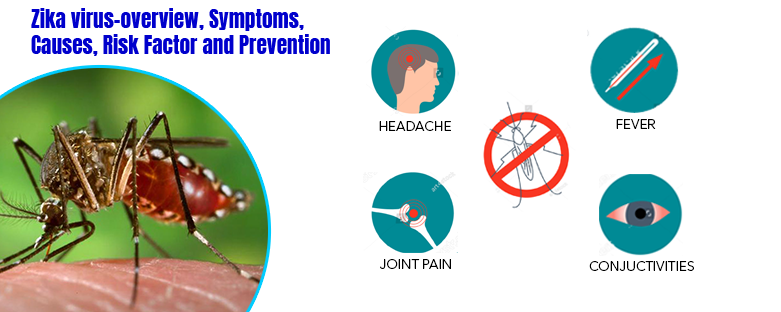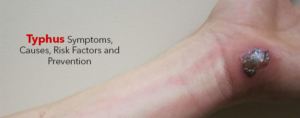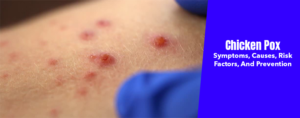Zika virus-overview, Symptoms, Causes, Risk Factor and Prevention
Overview
The Zika (ZEE’-Kuh) virus is a mosquito-borne viral infection found mainly in tropical and subtropical regions of the world. There are no signs and symptoms in people infected with the Zika virus, although other shows moderate fever, rash and muscle aches. Many symptoms can include headache, red eyes (conjunctivitis) and a general sense of discomfort. Zika virus is also known as Zika or Zika virus disease. Here in the blog we will discuss about Zika Virus Symptoms, its causes and the Prevention steps.
Infection of the Zika virus during pregnancy is related to miscarriage and may result in microcephaly, a potentially fatal congenital brain condition. Many neurological conditions such as Guillain-Barre syndrome can also cause by the zika virus.
Symptoms
The zika virus has no signs as many as 4 out of 5 people infected with the Zika virus have no signs or symptoms. When symptoms do occur, they usually begin two to seven days after a person is bitten by an infected mosquito. most signs and symptoms of the Zika virus include:
- Mild fever
- Rash
- Joint or muscle pain
Other signs and symptoms can include:
- Headache
- Red eyes
The majority of people recover completely, with symptoms improving within around a week.
Read Also:Coronaviruses: Symptoms, Treatments, And Prevention
When to see a doctor
If you think you or a family member might have the Zika virus, see your doctor, mainly if you have recently travelled to an area where there’s an on-going outbreak. The Canters for Disease Control and Prevention (CDC) has blood tests to check for the Zika virus or related diseases like dengue or chikungunya viruses, which are transmitted by the same type of mosquitoes.
Causes
The Zika virus is mainly transmitted through the bite of an infected Aedes species mosquito, which can be found worldwide. The virus was first detected in Uganda’s Zika Forest in 1947, but since then outbreaks have been recorded in Southeast and South Asia, the Pacific Islands and the Americas.
The virus comes into the human when a mosquito bites a human infected with the Zika virus. The virus reaches the person’s bloodstream when the infected mosquito then bites another human. During pregnancy, the virus can spread to the fetus too. The virus has been confirmed to have spread through sexual contact and blood transfusion.
Risk factors
Factors that place you at greater risk of Zika virus development include:
• Living or travelling in countries where there have been outbreaks. For both tropical and subtropical countries, the chance of exposure to the virus that causes the Zika virus is increased. Particularly high-risk areas include some Pacific zone islands, a number of Central, South and North American countries and islands close to West Africa. Since the mosquito that spreads the Zika virus is found worldwide, outbreaks are likely to continue expanding into new areas.
The mosquitoes which carry the Zika virus are found in some parts of the U.S. Many reports of U.S. Zika virus infection were identified in travellers returning to the United States. However, local transmission was recorded in some areas of the U.S. and in Puerto Rico.
• Having unprotected sex: The Zika virus can spread via sex to another human. The CDC recommends using condoms or avoiding intercourse for three months if male sex partners or a pair that involves a male and female partner travel to an area at risk for Zika. When female partners travel to an area at risk from Zika, the CDC recommends that they use contraceptives or stop sex for at least two months. The CDC also recommends abstinence from sexual activity during pregnancy or condom use during all sexual interaction for a pregnant woman or partner travelling to or in an area of active transmission of Zika virus.
Complications
Zika virus infections during pregnancy have been linked to miscarriage and microcephaly, a potentially fatal congenital brain condition.
Read Also:Safety Tips To Avoid Coronavirus (COVID-19)
The Zika virus may also cause congenital Zika syndrome, which includes these birth defects:
- Severe microcephaly with a partly collapsed skull
- Brain damage and reduced brain tissue
- Eye damage
- Joint problems, including limited motion
- Reduced body movement due to too much muscle tone after birth
The Zika virus also may cause other neurological disorders such as Guillain-Barre syndrome.
Prevention
There is no vaccine to protect against the Zika virus.
The CDC recommends all pregnant women avoid travelling to areas where there is an outbreak of the Zika virus. If you have a partner who lives in or has travelled to an area where there is an outbreak of the Zika virus, the CDC recommends abstaining from sex during pregnancy or using a condom during sexual contact.
If you are trying to get pregnant, explore any future travel plans with your doctor and the possibility of being infected with the Zika virus. Your doctor may recommend that you and your partner wait for some months to try and conceive.
Using a condom during sexual intercourse to minimize the risk of the Zika virus being contaminated or transmitted if you or your partner lives in or has travelled to an area where Zika virus is outbreaks. Or stop sexual intercourse.
Read Also:HIV/AIDS-Overview, Symptoms, Causes and Prevention Tips
If you are living or travelling in tropical areas where the Zika virus is known to be, these tips may help reduce your risk of mosquito bites:
Stay in air-conditioned or well-screened housing. The mosquitoes that carrying the Zika virus are most active from dawn to dusk, but they can strike at night as well. Consider sleeping under a net of a mosquito bed, especially if you are outside.
Wear protective clothing: wear a long-sleeved shirt, long trousers, socks and shoes when entering mosquito-infested areas.
Use mosquito repellent: Permethrin can be applied to your clothing, shoes, and gear for camping and to bed netting. You can also purchase clothes already made with permethrin in it. Using a repellent of at least 10 percent DEET concentration for your skin.



